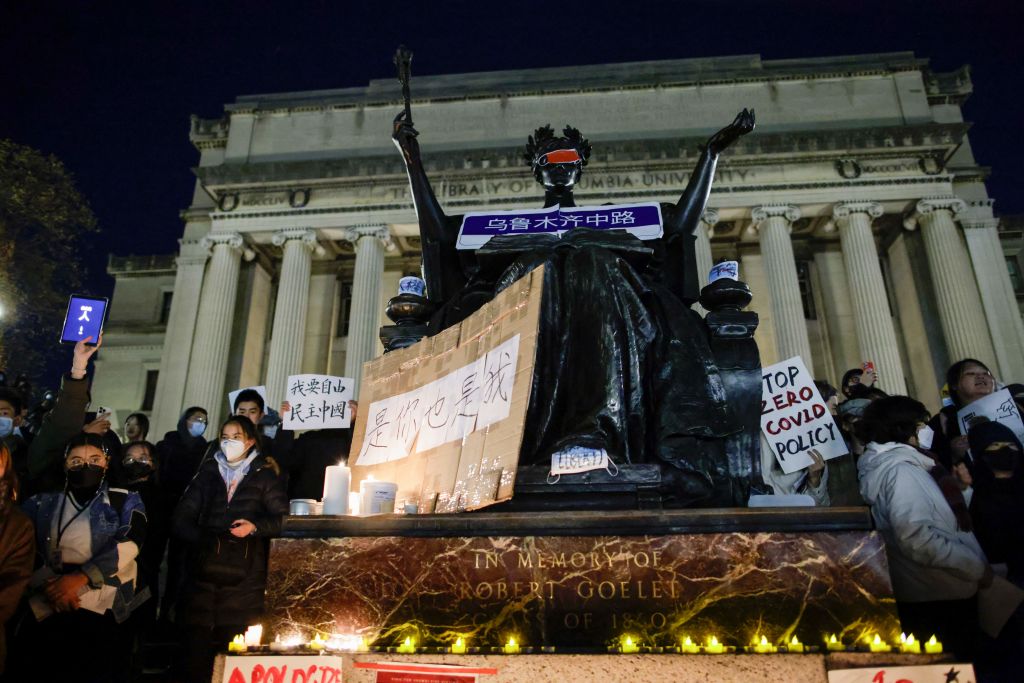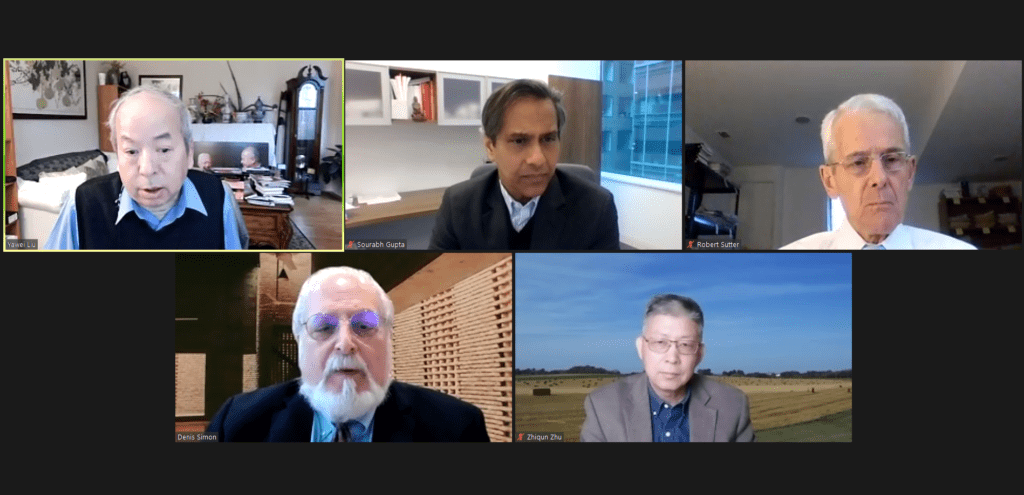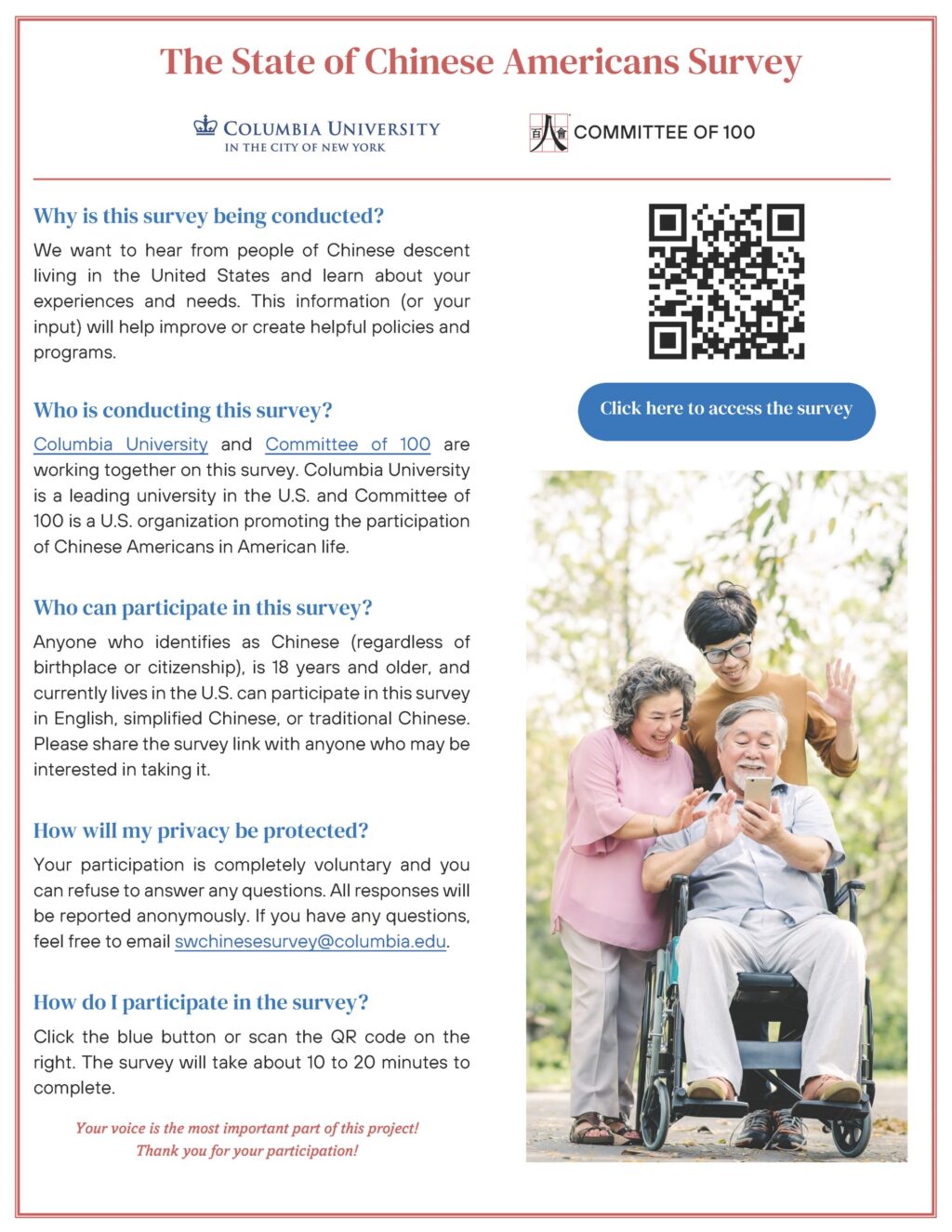
ICAS Bulletin (online ISSN 2836-3418, print ISSN 2836-340X) is published every other week throughout the year at 1919 M St NW, Suite 310, Washington, DC 20036.
The online version of ICAS Bulletin can be found at chinaus-icas.org/bulletins/.

– NATO held the first-of-its-kind dedicated debate around Taiwan, coming as the U.S. looks to convince other members of the alliance to place their attention towards a possible Chinese threat to Taiwan.
– U.S. and Chinese militaries had a harsh exchange on November 29 after a US Navy warship performed a freedom of navigation operation (FONOP) in the South China Sea.
– Beijing released a response to the US Navy’s FONOP by claiming that the U.S. warship “illegally” entered disputed waters around the Spratly Islands and surrounding reefs without the approval of the Chinese government.
– The US Navy has denied Chinese statements around the FONOP mission, stating that the U.S. “is defending every nation’s right to fly, sail, and operate wherever international law allows” and that “[n]othing the PRC says otherwise will deter us.”
– The U.S. Department of Defense has released its 2022 report on “Chinese Military Power,” in a Pentagon press statement that China is looking to challenge the U.S. both militarily and in U.S.-Taiwan relations; most prominently by increasing its stockpile of nuclear weapons.
– The U.S. is reportedly looking to influence its European allies to take a more hostile stance towards Beijing, coming as the U.S. also looks for support from allied countries in the Pacific to counteract China’s influence in that region.
– Chinese Defense Minister Wei Fenghe has told U.S. counterparts that Taiwan is a “red-line” issue that cannot be crossed by the U.S. or allies, explaining that, since“[t]he resolution of Taiwan is a matter for Chinese people, no external force has the right to interfere.”
– During a visit to the Philippines, U.S. Vice President Kamala Harris called for allied countries to place a harder stance on China and be more vocal around territorial integrity and navigation in the South China Sea.
Associated News References:
“Nato holds first dedicated talks on China threat to Taiwan,” Financial Times, November 30 [Paywall]
“US and China in first South China Sea encounter since Xi-Biden meeting,” CNN, November 29
“China’s Swelling Nuclear Stockpile Makes It a Growing Rival to U.S., Pentagon Finds,” The Wall Street Journal, November 29 [Paywall]
“China says it warned US warship away after ‘illegally’ entering waters off Spratly Islands in South China Sea,” South China Morning Post, November 29 [Paywall]
“US steps up pressure on European allies to harden China stance,” Financial Times, November 29 [Paywall]
“Taiwan is at the core of China’s core interests – Chinese defence minister,” Reuters, November 22 [Paywall]
“Kamala Harris says U.S. will defend Philippines in South China Sea,” NBC News, November 22

– The U.S. Secret Service released a report on December 5, which stated that Chinese hackers have stolen tens of millions of dollars from the U.S. COVID-19 relief funds.
– Two Republican senators from North Dakota have urged local officials to kill a new Chinese corn mill project, claiming that the project’s location to the Grand Forks Air Force Base raises serious national security concerns.
– Four of the top Chinese solar-manufacturers have managed to step around U.S. tariffs by rerouting some operations through different routes of Southeast Asia, as reported by the U.S. Department of Commerce.
– In reaction to protests in China around growing discontent with ‘Zero-Covid’ policies, Wall Street stocks fell and stoked new worries around possible further crackdowns on dissidents’ effects on the Chinese economy.
– Six American casino operators won provisional licenses to keep operating in Macau for the next decade, amongst a new gambling law that plans to impose additional Chinese oversight over casino operations.
– Beijing’s Ambassador to Japan, Kong Xuanyou, made a statement about the potential decoupling of U.S.-Chinese supply chains: “It’s bargaining between super powers…We have no intention of fighting with the U.S. but they assume that we do.” The ambassador also made statements encouraging Japan to not engage with possible decoupling strategies from Western allies.
– Washington has extended tariff extensions on Chinese COVID-19 related medical products, masks, gloves, and hospital gowns for another 90 days, as announced by USTR Katherine Tai.
Associated News References:
“Chinese hackers stole millions worth of U.S. COVID relief money, Secret Service says” Reuters, December 5 [Paywall]
“North Dakota senators tried to kill Chinese corn mill project amid national security review: emails,” South China Morning Post, December 1 [Paywall]
“Chinese Solar Manufacturers Dodged U.S. Tariffs, Probe Finds,” The Wall Street Journal, December 5 [Paywall]
“U.S. stock indexes fall as coronavirus lockdown protests spread in China,” Los Angeles Times, November 28
“COVID-19 lockdown protests in China rattle US, world markets,” The Hill, November 28
“American Casino Giants Win 10-Year Macau License Renewals,” The Wall Street Journal, November 25 [Paywall]
“U.S. can’t decouple from China, says Beijing’s ambassador to Tokyo,” Nikkei Asia, November 24 [Paywall]
“U.S. extends tariff exclusions on Chinese COVID-related medical products,” Reuters, November 23 [Paywall]

– President Xi Jinping will visit Saudi Arabia for the first time in six years, apparently desiring to boost Chinese relations with the country after Washington sent a warning to Beijing that it would not cede the region to China or “anyone else.”
– U.S. Director of National Intelligence Avril Haines said that Chinese leaders are unwilling to accept Western and American-made vaccinations for COVID-19 despite the growing challenges China is facing.
– U.S. prosecutors have asked for the dismissal of all charges against Meng Wenzhou, Huawei’s Chief Financial Officer, whose arrest in 2018 skewed bilateral relations.
– After the Pentagon commented in a report to Congress that “[t]he PRC seeks to prevent border tensions from causing India to partner more closely with the United States,” Beijing warned the U.S. not to interfere in China-India relations.
– The U.S. Ambassador to China Nicholas Burns released a statement saying that China shouldn’t interfere with “extraordinary” protests in-response to recent discontent with COVID-19 policies. Burns explained, “[w]e believe that Chinese people have a right to protest peacefully, they have a right to make their views known.”
– White House COVID-19 response coordinator Ashish Jha believes “it’s going to be very, very difficult for China to be able to contain this through their zero-COVID strategy,” in regards to both recent protests as well as the Chinese government’s re-assertion of ‘zero-covid policies.’
Associated News References:
“China steps on Washington’s toes as Xi heads to Saudi Arabia,” Financial Times, December 4 [Paywall]
“China’s Xi unwilling to accept western vaccines, U.S. official says,” Reuters, December 4 [Paywall]
“Huawei CFO’s U.S. bank fraud charges to be dismissed” Reuters, December 1 [Paywall]
“China wants US not to interfere in ties with India – Pentagon” Reuters, November 30 [Paywall]
“China Must Let ‘Extraordinary’ Protests Continue, US Envoy to Beijing Says” Bloomberg, November 29 [Paywall]
“Biden administration reacts with caution to China protests” Politico, November 28 [Paywall]
“Top US health official: China’s ‘zero-COVID strategy’ not realistic” The Hill, November 27

– U.S. President Biden will visit Taiwan Semiconductor Manufacturing Company’s (TSMC’s) plant in Arizona after TSMC said it would more than triple its planned investment there to $40 billion; among the largest foreign investments in U.S. history.
– The Chinese Ministry of Commerce opposed the U.S. Federal Communications Commission’s (FCC’s) ban on new Chinese telecommunication equipment sales, now looking to adopt measures to ensure the rights of Chinese firms. Bans have included communications equipment made by China’s Huawei and ZTE, with the U.S. citing an “unacceptable risk” to national security as the reason.
– On November 30, U.S. Secretary of Commerce Gina Raymond said the U.S. is “not seeking the decoupling from China,” which is seen by some observers as a continuation of decreasing economic bilateral tensions.
– Major recent disruptions at Apple’s manufacturing hub in Zhengzhou have caused Apple to likely lose close to six million iPhone Pro units this year.
– New concerns have begun to rise among European chip deals over their links with China amidst U.S. pressure to decouple western chipmaking supply chains from China.
Associated News References:
“Biden to visit Taiwan’s TSMC chip plant in Arizona, hail supply chain fixes,” Reuters, December 5 [Paywall]
“TSMC Plans to Make More Advanced Chips in US at Urging of Apple” Bloomberg, December 1 [Paywall]
“China will move to protect its firms following U.S. telecoms ban” Reuters, December 1 [Paywall]
“Biden Gets Victory Lap With $12 Billion TSMC Plant, Arizona Wins” Bloomberg, November 30 [Paywall]
“U.S. Not Seeking Decoupling From China, Commerce Chief Says” The Wall Street Journal, November 30 [Paywall]
“US chip war to hit allies as hard as it does China” Asia Times, November 30 [Paywall]
“Apple to Lose 6 Million iPhone Pros From Tumult at China Plant” Bloomberg, November 28 [Paywall]
“US FCC bans sales, import of Chinese tech from Huawei, ZTE” AP, November 25
“The US-China chip war is spilling over to Europe” CNN, November 25
“How Washington chased Huawei out of Europe” Politico, November 23

– About 200 protesters gathered near the White House in support of demonstrations in China and calling for change.
– Former NBA star Jeremy Lin has been fined 10,000 Chinese Yuan ($1,400) by the Chinese government for his criticism of Chinese quarantine facilities.
– President Xi Jinping acknowledged frustration amid Chinese protesters around his zero-Covid strategy, and hinted at a possible relaxation of certain current zero-Covid policies.
– Despite large-scale economic decoupling initiatives, Chinese start-ups are looking for ways to expand into the U.S. and allied markets, attempting to avoid backlash in western markets that companies such as TikTok have received.
– Hundreds of students at prominent U.S. universities such as Harvard, Columbia, and the University of Chicago gathered to protest Chinese President Xi Jinping and the Chinese government’s ‘Zero-Covid policies’ effects on both Chinese social unrest and economic slowdowns.
– American researchers have released statements that logistical hurdles and intensive quarantine measures have made it difficult for researchers to conduct normal trips to China, reasserting the importance of in-person interactions, and the damaging effects from limiting travel.
– China faces a slow exit from ‘Covid Zero’ due to lack of intensive care unit beds and concern around lack of widespread treatment availability for patients with COVID-19.
Associated News References:
“Protesters near White House demand ‘Free China!,” AP, December 5
“China fines former NBA star Lin over quarantine comments,” AP, December 2
“China’s Xi acknowledges Covid frustration caused protests and hints at relaxing rules, EU official says,” CNN, December 2
“Chinese Startups Try to Make It Big in the U.S.—but Without the Backlash,” The Wall Street Journal, November 29 [Paywall]
“Hundreds at Harvard, NYC, Chicago protest China’s actions,” AP, November 29
“Being there: American researchers extol benefits of returning to China,” South China Morning Post, November 27 [Paywall]
“China’s Exit From Covid Zero Seen Stretching Beyond 2023,” Bloomberg, November 23 [Paywall]
“China’s LONGi denies circumventing U.S. tariffs on solar panels,” Reuters, December 5 [Paywall]
“Hackers linked to Chinese government stole millions in Covid benefits, Secret Service says,” NBC News, December 5
“U.S. designates Iran, China as countries of concern over religious freedom,” Voice of America, December 2
“Hong Kong sees IPO slowdown reversing; eyes international issuers,” Reuters, November 30 [Paywall]
“White House Says Chinese Have a Right to Peacefully Protest,” The Wall Street Journal, November 28 [Paywall]
“Jiang Zemin, Leader Who Guided China Into Global Market, Dies at 96,” The New York Times, November 30 [Paywall]
“China Launches Astronauts to Newly Completed Space Station,” The New York Times, November 29 [Paywall]
“China poses increasing threat in military space race, top U.S. general says,” Reuters, November 27 [Paywall]
“China-based Semcorp bets big on ‘Made in America’ despite some Ohio locals’ suspicions,” South China Morning Post, November 25 [Paywall]
“China Allows Disney’s New ‘Avatar’ Movie to Be Shown,” The Wall Street Journal, November 22 [Paywall]
“Tech startups shun Singapore and Hong Kong for U.S. SPACs,” Nikkei Asia, November 21 [Paywall]
December 1 hosted by Brookings
December 1 hosted by National Bureau of Asian Research
November 30 hosted by Atlantic Council
November 28 hosted by The Carter Center
November 28 hosted by Wilson Center
December 12 hosted by Wilson Center
December 8 by The International Institute for Strategic Studies
December 8 hosted by Center for Strategic & International Studies
December 9 hosted by Center for Strategic & International Studies

On November 30, 2022, the Institute for China-America Studies (ICAS) hosted a virtual public event to discuss the state of U.S.-China relations following the first in-person meeting of President Joe Biden and President Xi Jinping on the sidelines of the G20 Leaders Summit in Bali, Indonesia. The event was titled “Of ‘Guardrails’ and ‘Floors’: Biden-Xi Meeting and Outlook for U.S.-China Relations and the Taiwan Question.” The event was moderated by Mr. Sourabh Gupta, Senior Fellow and Head of ICAS’ Trade n’ Technology Program, and featured four speakers: Dr. Yawei Liu, Senior Advisor on China at The Carter Center, Dr. Robert Sutter, Professor of Practice of International Relations at George Washington University, Dr. Zhiqun Zhu, Professor of Political Science & International Relations at Bucknell University, and Dr. Denis Simon, Professor of China Business and Technology & Senior Advisor to the President for China Affairs at Duke University.
The panelists were in broad agreement that the inauguration of a new phase of strategic communications at the Biden-Xi meeting in Bali was a welcome and stabilizing development. In trying to address the multiplicity of difficult issues plaguing U.S.-China relations, it was acknowledged that there is no substitute for face-to-face communications and on-going dialogue to help moderate the potential for miscalculation and misperception. The hope is that the Bali meeting will set a positive direction and kick off a process that cements a “floor” under the bilateral relationship. Equally, the panelists were in broad agreement that none of the deep structural challenges that bedevil the relationship had disappeared. It is important to be clear-eyed that cut-throat competition is the central feature of U.S.-China relations. Beijing would much prefer that the two sides adopt a ‘peaceful coexistence, no conflict, no confrontation’ bottom line and sincerely adhere to it. The continuity in foreign and security policy personnel and policies at the 20th Party Congress was an expression of this preference for stability and peaceful coexistence. In Washington though, the prevailing bipartisan view is that the toughened stance on China has paid dividends. Pressure on China works; hence, the imperative going forward is to maintain that pressure and emphatically approach the bilateral relationship from a position of strength.
Overall, the immediate outlook for U.S.-China relations and the Taiwan Question is mixed. A somewhat more stable bilateral equation can be anticipated in 2023. On the other hand, the capture of the House by the Republicans and potential episodes such as the vow of incoming speaker, Kevin McCarthy, to pay a visit to Taipei could inject dangerous instability into the relationship. With a view to breaking down the barriers of mistrust and zero-sum attitudes on both sides, it was suggested that the two sides consider collaborating on a flagship project of common interest. With greying populations on both sides of the Pacific, a marquee U.S.-China project on cancer or Alzheimer’s disease-related research could provide a shot in the arm to the bilateral relationship.
The Chinese-language version of the ICAS Blue Carbon & Climate Change (BCCC) Quarterly 2022 Q3 is out! 蓝碳与气候变化主题研究第三季度季刊中文精选版现已发布!
In an effort to share our research and news with an Asian audience on this essential, cooperative topic, the main points of this quarterly newsletter will be periodically translated into Chinese. 本季刊定期发布涉及蓝碳与气候变化主题的要点及内容的中文翻译,以帮助中文群体更好的了解这一重要议题的研究及发展动态。
This quarter’s Theme of the Quarter was ‘Global Extreme Weather’ and the Blue Carbon Country Profile was on ‘The United States’. 当季度蓝碳及气候变化关键词为“全球极端气候”,本季度的蓝碳国家专题介绍了美国的情况。

On Wednesday, November 23, 2022, Senior Fellow Sourabh Gupta was quoted by South China Morning Post on Xi Jinping’s recent in-person diplomatic meetings.
On Monday, December 5, 2022, ICAS TnT Program Senior Advisor Denis Simon’s visit with Li Meng, Vice Minister of Science and Technology, was highlighted by Sinocism. Dr. Simon’s meeting was also officially summarized by the Chinese Ministry of Science and Technology on December 2.
To our ICAS audience,
As previously noted, ICAS has been invited to partner on an important project. Columbia University and Committee of 100 have developed a nationwide survey focused on Chinese Americans, to gather information that will shed light on the status and needs of today’s Chinese American population.
Anyone who identifies as Chinese (regardless of birthplace or citizenship), is 18 years or older, and currently lives in the U.S. can participate. Survey links are also welcome to be shared with anyone who may be interested in taking it.
This is the first survey of its kind that is designed to focus specifically on Chinese Americans, and the survey findings will be used to inform policymakers and the public on policies and programs that can better serve the needs of Chinese American communities across the country.
Your participation, which is completely voluntary, is the most important part of this project, and you are encouraged to take this survey HERE today and make your voice heard!
Note: The survey is available in English, traditional Chinese, and simplified Chinese.
The ICAS Team


The Institute for China-America Studies is an independent nonprofit, nonpartisan research organization dedicated to strengthening the understanding of U.S.-China relations through expert analysis and practical policy solutions.
1919 M St. NW Suite 310,
Washington, DC 20036
icas@chinaus-icas.org
(202) 968-0595
© 2024 INSTITUTE FOR CHINA-AMERICA STUDIES. ALL RIGHTS RESERVED.